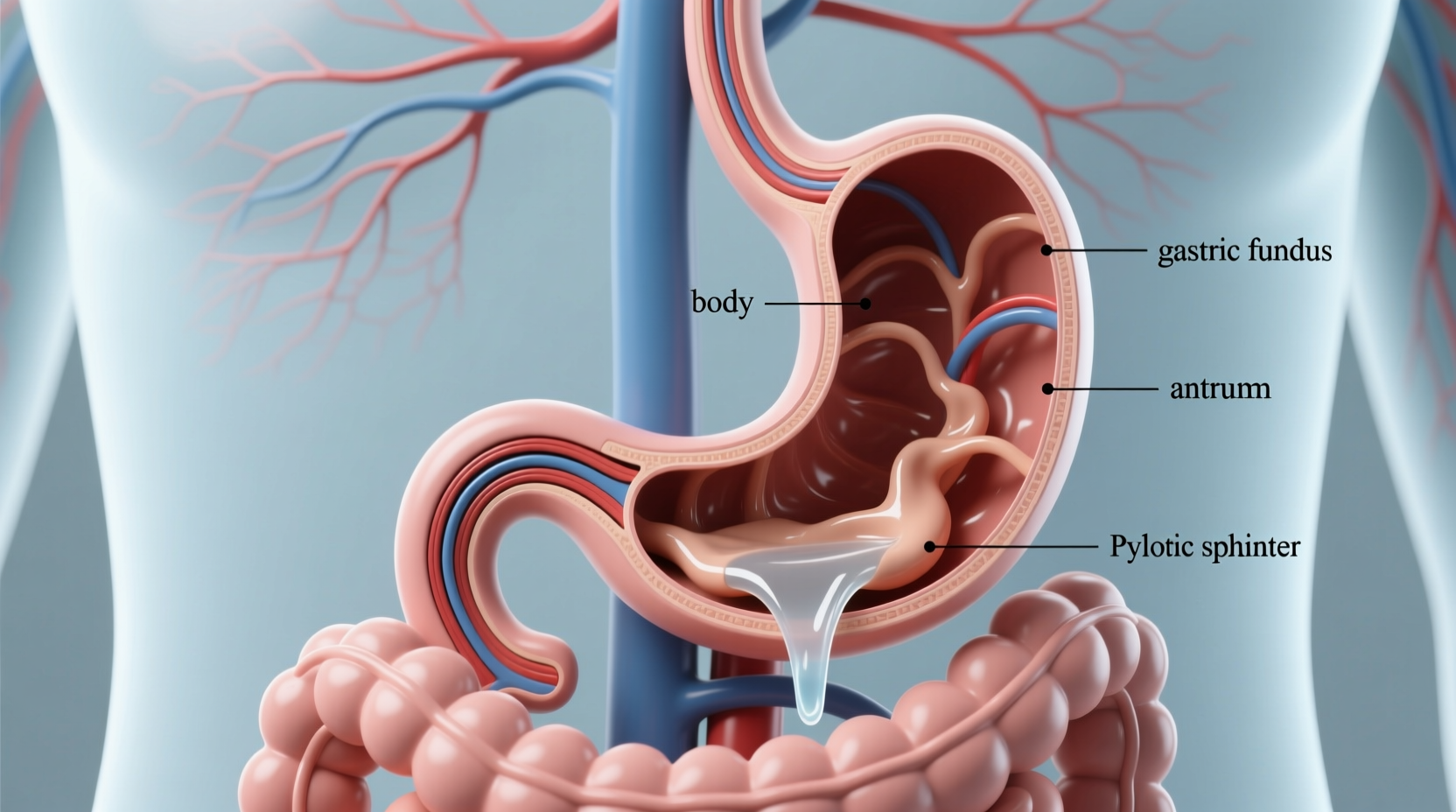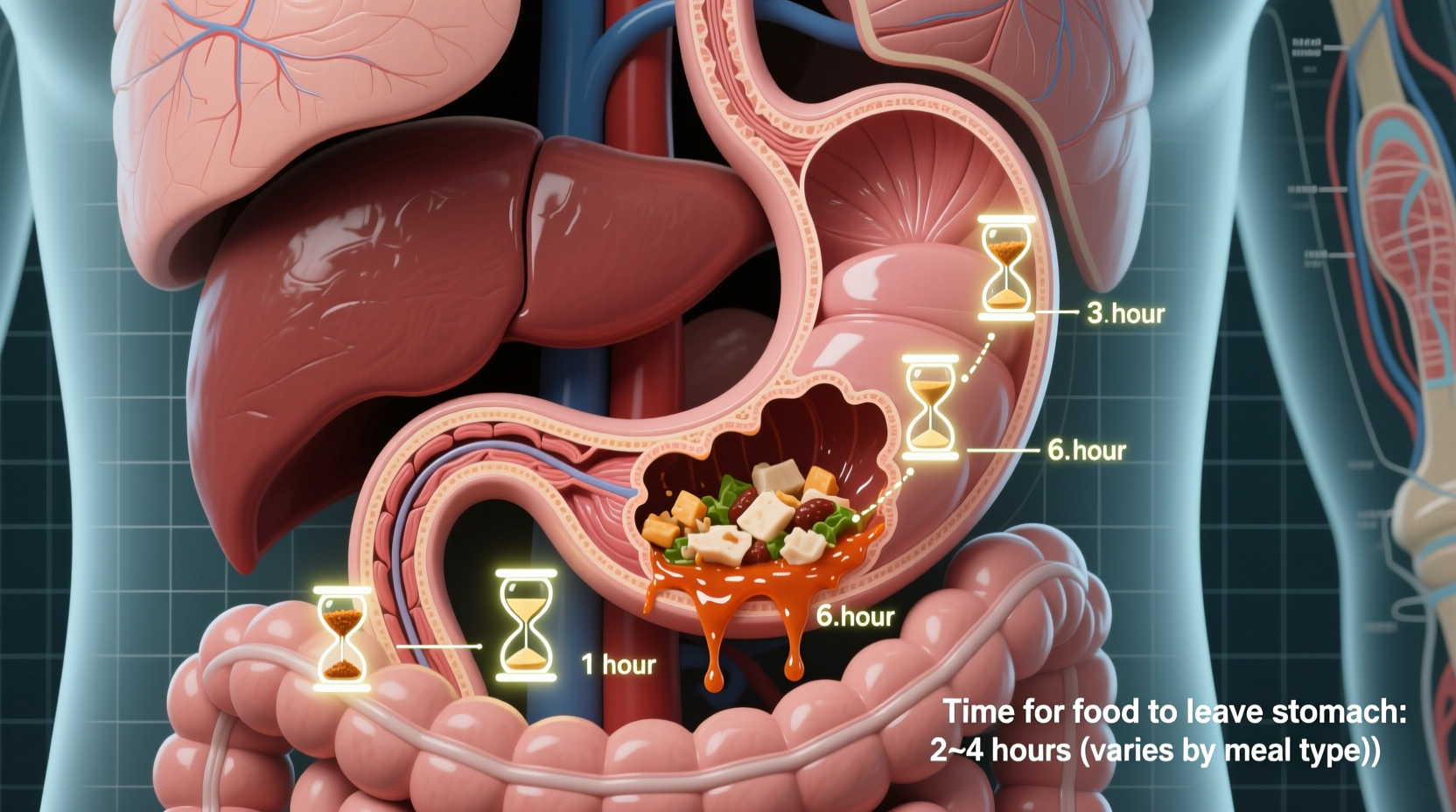Most food takes 2-5 hours to leave your stomach, with liquids passing through in as little as 20 minutes while high-fat meals can take up to 6 hours. This gastric emptying time varies significantly based on food composition, portion size, and individual health factors.
Understanding how long food stays in your stomach isn't just academic curiosity—it directly impacts when you should eat before exercise, how medications are absorbed, and when to schedule medical procedures. Whether you're an athlete optimizing performance, managing digestive issues, or simply curious about your body's inner workings, knowing the science behind gastric emptying helps you make informed decisions about your eating patterns.
What Science Tells Us About Gastric Emptying Time
Your stomach serves as both a storage tank and mechanical processor, breaking down food through muscular contractions and acid secretion before gradually releasing it into the small intestine. This process, called gastric emptying, follows predictable patterns based on food composition:
| Food Type | Average Emptying Time | Key Influencing Factors |
|---|---|---|
| Clear liquids (water, broth) | 10-20 minutes | Temperature, volume, electrolyte content |
| Carbohydrate-rich foods | 60-90 minutes | Fiber content, sugar concentration |
| Protein-containing meals | 2-3 hours | Protein type, accompanying fats |
| Fat-heavy meals | 3-6 hours | Fat quantity, meal volume |
This data aligns with research published in the Journal of Neurogastroenterology and Motility, which demonstrates how macronutrient composition directly influences gastric emptying rates. High-fat meals trigger hormonal responses that slow stomach contractions, while simple carbohydrates move through more quickly.
Your Personal Digestion Timeline
While general guidelines exist, your actual gastric emptying time depends on several individual factors. Consider this typical progression after a standard mixed meal:
- 0-15 minutes: Liquids begin moving through immediately, with water exiting fastest
- 30-60 minutes: Carbohydrates start emptying, especially simple sugars
- 1-2 hours: Protein digestion accelerates as stomach acid breaks down complex structures
- 2-4 hours: Fat content significantly slows the process, delaying complete emptying
- 4-6 hours: Stomach typically returns to baseline, preparing for next meal

What Actually Controls Your Digestion Speed
Several evidence-based factors determine how quickly your stomach processes food:
Food Composition Matters Most
Research from the Mayo Clinic confirms that fat content has the strongest slowing effect on gastric emptying. A meal containing 50g of fat can double emptying time compared to a fat-free meal of equal volume. Fiber also plays a significant role—while soluble fiber slows emptying (helping with blood sugar control), insoluble fiber has less impact on stomach processing time.
Individual Physiology Differences
Your unique biology significantly affects digestion speed. Studies show gastric emptying rates vary by up to 40% between healthy individuals due to factors including:
- Natural variations in stomach muscle strength
- Hormone production levels (particularly cholecystokinin)
- Vagal nerve function
- Age-related changes in digestive efficiency
Practical Applications for Daily Life
Understanding gastric emptying times helps you optimize several everyday scenarios:
Before Exercise
For optimal performance, time your meals based on intensity. According to sports nutrition guidelines from the Hospital for Special Surgery, allow 3-4 hours after a high-fat meal before vigorous activity, but only 1-2 hours after a light carbohydrate snack. Eating too close to exercise redirects blood flow from digestion to muscles, causing cramps and discomfort.
Before Medical Procedures
Most medical guidelines, including those from the American Society of Anesthesiologists, require 6-8 hours fasting before procedures involving sedation. This ensures your stomach has completely emptied, reducing aspiration risk. Clear liquids may be permitted up to 2 hours before procedures since they exit the stomach quickly.
Managing Digestive Conditions
Those with gastroparesis (delayed gastric emptying) often experience symptoms when food remains in the stomach beyond 4-6 hours. The National Institute of Diabetes and Digestive and Kidney Diseases recommends smaller, low-fat, low-fiber meals for these individuals to improve emptying times and reduce symptoms like nausea and bloating.
When to Consult a Professional
While occasional variations in digestion are normal, consult a healthcare provider if you experience:
- Persistent nausea or vomiting after meals
- Feeling full after small portions
- Unintended weight loss with normal eating
- Abdominal pain lasting more than 24 hours
These symptoms could indicate conditions like gastroparesis, peptic ulcers, or other digestive disorders requiring medical evaluation. Diagnostic tests such as gastric emptying studies can precisely measure your stomach's processing time.
Optimizing Your Natural Digestion
You can support healthy gastric emptying through evidence-based lifestyle choices:
- Chew thoroughly: Mechanical breakdown starts in your mouth—aim for 20-30 chews per bite
- Manage stress: High cortisol levels slow digestion; practice deep breathing before meals
- Stay hydrated: Sip water throughout the day, not large amounts during meals
- Time fats strategically: Consume heavier fats earlier in the day when digestion is most efficient
Common Questions About Stomach Emptying
How long does water stay in your stomach?
Water begins emptying immediately and typically clears the stomach within 20 minutes. Cold water may move slightly faster than room temperature water, and larger volumes (more than 8 ounces) can temporarily distend the stomach, slowing the process slightly.
Does eating protein slow digestion more than fat?
Fat has the strongest slowing effect on gastric emptying. While protein does slow emptying compared to carbohydrates alone, a high-fat meal will remain in your stomach significantly longer than a high-protein meal of equal volume. This is why fried foods often cause prolonged fullness and discomfort.
Can you speed up stomach emptying naturally?
Gentle movement like walking after meals can stimulate gastric motility. Consuming ginger or peppermint may also support digestion, though evidence is mixed. Avoid lying down immediately after eating, as gravity assists the emptying process. However, significant acceleration beyond your natural rate isn't advisable or typically possible through natural means.
How does diabetes affect stomach emptying time?
Diabetes can cause gastroparesis, where nerve damage slows stomach emptying. This affects blood sugar management since food enters the small intestine unpredictably. People with diabetes should work with their healthcare team to adjust meal timing and composition to accommodate potential delays in gastric emptying.
Why do some foods make me feel full longer than others?
Foods high in protein and healthy fats trigger stronger satiety hormones and slow gastric emptying, creating longer-lasting fullness. Fiber-rich foods also expand in the stomach, increasing volume without calories. This explains why a breakfast of eggs and avocado keeps you satisfied longer than a sugary cereal of equal calories.











 浙公网安备
33010002000092号
浙公网安备
33010002000092号 浙B2-20120091-4
浙B2-20120091-4